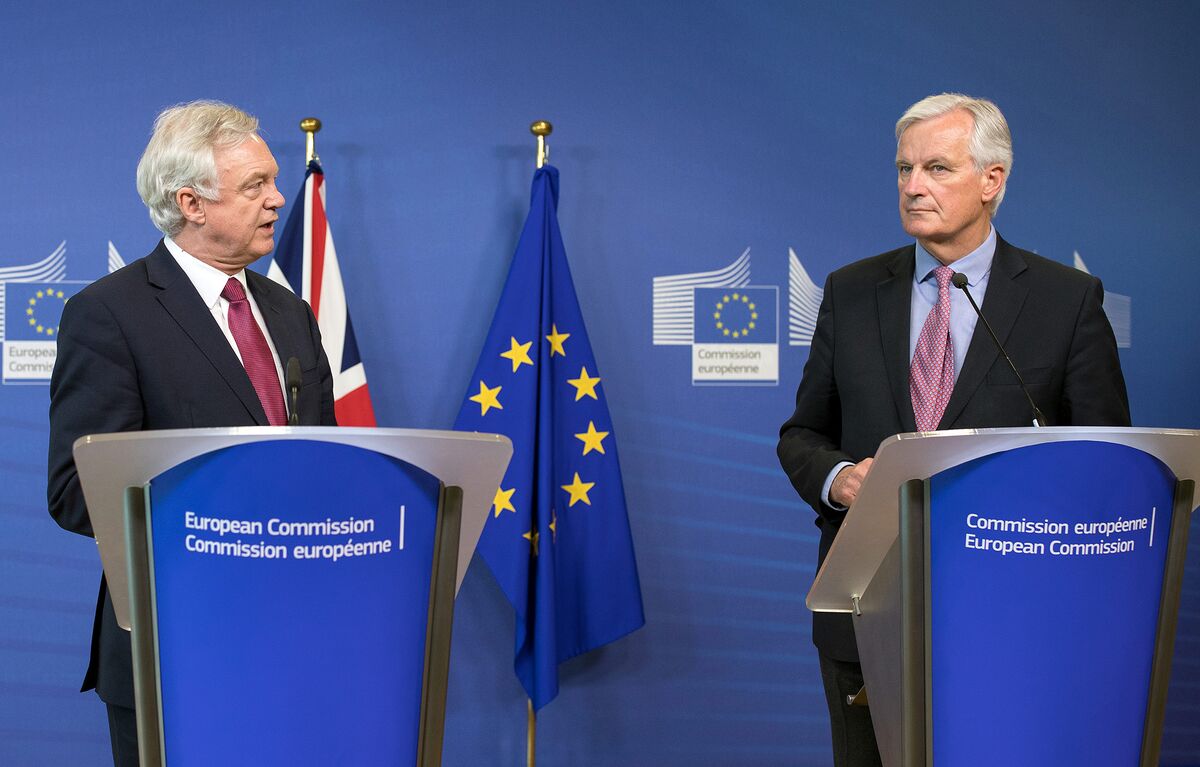
The European Union’s chief Brexit negotiator, Michel Barnier, spent the weekend hiking in the French Alps. His British counterpart, David Davis, spent it mired in political intrigue over the fate of his boss, Prime Minister Theresa May.
The contrast underscored the relative positions as they headed into their first formal talks on unwinding the U.’s four decades of membership in Europe’s common market. In the year since 52 percent of voters confounded the experts by choosing to leave the bloc, the island nation has been increasingly destabilized just as the bonds of the 27 other EU nations tightened.
The upshot is that May’s leverage is draining away as she fends off domestic political opponents—some likely within her own government—as well as the demands of Davis’s interlocutors.
Things unraveled rapidly after her Conservatives lost their parliamentary majority in an election 11 days ago. May had called the vote to crush opposition to her vision for Brexit, so having warned on the campaign trail of a “weak and unstable prime minister” heading into negotiations, May is discovering the description applies to her.
A slow response to last week’s horrific inferno in a London tower block only added to speculation May won’t be in office much longer. Newspaper reports suggest some in her party are already considering ways to topple her, with Davis mentioned as a possible successor. Another terrorist attack on Monday served to underscore how subject to events outside of her control she is.
May has begun to reconsider her approach to Brexit. She entered the election vowing to regain control over immigration and British laws, accepting the risk Britain’s tariff-free, regulation-light trade with its biggest market. If the EU balked at her demands, then she would walk away without a deal, she declared.
Now chastened by the electorate, she is pledging to reflect a wider range of views. Senior ministers, including Chancellor of the Exchequer Philip Hammond, are already changing the tone to suggest a renewed emphasis on safeguarding jobs.
While he is sticking to the original “hard Brexit” plan, Davis arrived at the today’s talks striking a conciliatory note. “We are starting this negotiation in a positive and constructive tone,” he said outside the European Commission’s headquarters in Brussels. “There is more that unites us than divides us.”
There`s little evidence Britons have changed their mind over leaving the EU. More than 80 percent of them voted in the election for a party that advocated ditching the single market, while 77 percent told polling company YouGov that they wanted out. As May once said, “Brexit means Brexit.”
No Punishment
May’s ultimate dilemma, however, is that regardless of what she seeks, it will be the rest of the EU that determines the shape of Brexit. While its leaders pledge not to punish Britain for splitting, they’re desperate to avoid encouraging other breakaway movements, whether they be in the Spanish region of Catalonia or, more worryingly, in France or Italy.
That means denying May an easy ride. Instead the early part of the talks will be focused on thorny matters such as the bill the EU wants the U. to pay and the rights its citizens will enjoy in Britain after Brexit.
Only once “sufficient progress” is made on such topics will Barnier accede to talks turning to trade and the “bold and ambitious” pact May wants. With such an accord unlikely to be struck in the time left both sides will also need to agree a transitional period in which the status quo lingers a while after Brexit.
May’s chief problem may again lie more at home than abroad. EU officials say the U. cannot “cherry pick” the parts of membership it wants and that the best deal is what it has now. But any concessions on immigration or money to win access risk inflaming hard-line euroskeptics as well as the popular press.
That would raise the odds of talks collapsing, meaning when the U.K faced a period of uncertainty and sweeping tariffs. The “cliff edge” businesses fear will have been stepped over.
“The election result increased the probability of extreme outcomes,” said Phillip Souta, head of U. public policy at Clifford Chance LLP. “If there is going to be a deal, it makes it more likely to be softer than before the election, but on the other hand the probability of no deal at all has increased.”
Meantime, the clock is ticking. Britain’s departure is locked in by treaty for midnight Brussels time on March 29, 2019—whether there’s a deal or not.


0 comments:
Post a Comment